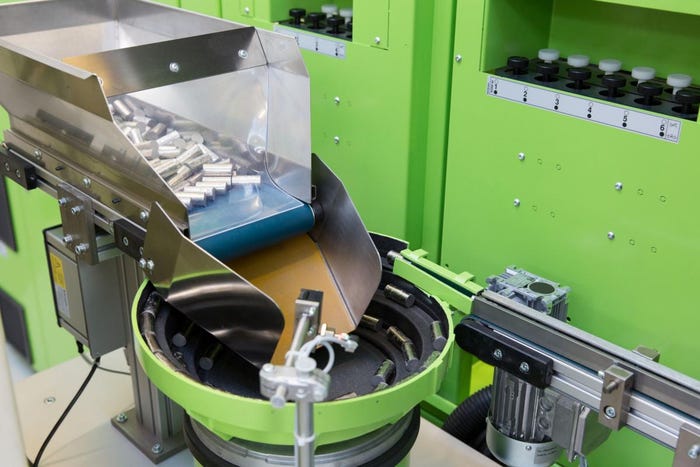Engel showcases pioneering Liquidmetal solutions at symposium
As the exclusive manufacturing partner of Liquidmetal Technologies Inc. (Rancho Santa Margarita, CA), the first company to develop and produce amorphous alloys in commercially viable bulk, Austrian machine manufacturer Engel GmbH is the sole provider worldwide to offer system solutions for the injection molding of Liquidmetal materials. The technology was presented to the public for the first time at last week’s Engel Symposium that was held from June 16-18 in St. Valentin and Linz, Austria, where a Liquidmetal production cell was molding parts for medical forceps.
June 24, 2015
As the exclusive manufacturing partner of Liquidmetal Technologies Inc. (Rancho Santa Margarita, CA), the first company to develop and produce amorphous alloys in commercially viable bulk, Austrian machine manufacturer Engel GmbH is the sole provider worldwide to offer system solutions for the injection molding of Liquidmetal materials. The technology was presented to the public for the first time at last week’s Engel Symposium that was held from June 16-18 in St. Valentin and Linz, Austria, where a Liquidmetal production cell was molding parts for medical forceps.
 With Liquidmetal, Engel is ushering in a new age of injection molding, based on the use of metal alloys. Discovered by researchers at the California Institute of Technology and developed by Liquidmetal Technologies, the technology opens the door to completely new classes of material and product characteristics. Liquidmetal alloys belong to a class of highly engineered materials called Bulk Metallic Glasses (BMG). Why glass? These zirconium alloys posses an amorphous structure: in other words, they freeze in an amorphous, vitreous state. As a solidified liquid, the solidification shrinkage rate is extremely low (0.4%), which allows molding to net shape.
With Liquidmetal, Engel is ushering in a new age of injection molding, based on the use of metal alloys. Discovered by researchers at the California Institute of Technology and developed by Liquidmetal Technologies, the technology opens the door to completely new classes of material and product characteristics. Liquidmetal alloys belong to a class of highly engineered materials called Bulk Metallic Glasses (BMG). Why glass? These zirconium alloys posses an amorphous structure: in other words, they freeze in an amorphous, vitreous state. As a solidified liquid, the solidification shrinkage rate is extremely low (0.4%), which allows molding to net shape.
As Dr. Gerhard Dimmler, Engel Vice President Research & Development Products, explained in his lecture: “It cannot absorb kinetic energy. That’s a property we can use.”
Components made from these materials are extremely hard, but at the same time highly elastic. Featuring an elasticity of 2%, compared to 0.2% for steel and 1% for titanium, Liquidmetal components demonstrate very good recovery behavior. Together with a low specific weight and excellent corrosion resistance, these properties make Liquidmetal alloys particularly suitable for molding precision components, which are subjected to high mechanical stresses.
The alloys are processed on an especially designed Engel machine developed on the basis of the tried and tested all-electric machine series Engel e-motion. The difference between a Liquidmetal machine and a conventional injection molding machine for plastics processing lies mainly in the injection unit. The Liquidmetal alloys are available in the form of slugs cut from round rods, which are fed automatically in to the vacuum induction melting chamber. Instead of a screw, the machine has a piston to inject the molten metal alloy into a thermo-regulated mold. “Cooling takes place very rapidly under oxygen-free conditions, to achieve an amorphous structure,” said Dimmler. “The advantages are: no grain boundaries, no weak regions. So no deformation.”
Standard robots—for example, from the Engel viper series—are used to remove the finished parts. The sprue can be removed with the help of a water-jet cutting machine or mechanical shears.
The Liquidmetal materials allow Engel to present a new production technology for ready-to-use precision parts with a very high surface quality in a single step and in short cycles that provides a serious alternative to metal injection molding (MIM) and CNC processing. Unlike the former, no sintering is required; unlike the latter no machining is required to obtain a high-quality surface finish.
The cycle times are between two and three minutes—significantly shorter than the processing time needed for CNC processing. The process generates no waste, as all sprues can be recycled.
“It is an interesting process, because it is so close to injection molding,” Dimmler said. “For Engel, it is as a useful complement to core business, to provide additional market access.”
Engel sees good potential for Liquidmetal Technology in the field of medical technology—the parts for the forceps being molded at the Symposium are a good example of a potential application—while endoprostheses, such as hip joints or stents are also conceivable. Thanks to the excellent mechanical properties of the material, very robust components can also be achieved with very low wall thicknesses.
Furthermore, there is a broad range of application in the fields of electronics, aerospace, military technology and sports equipment. It has already found a first area of application in the entertainment electronics and watch industries.
The technology is licensed by Liquidmetal Technologies. As the exclusive machine manufacturing partner, Engel builds injection molding solutions for licensed partners.
About the Author(s)
You May Also Like


